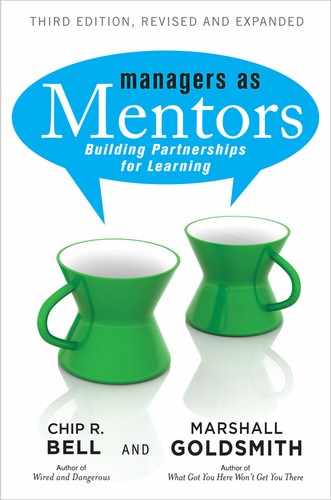Tool #3
Mentoring FAQs
Since this is the “instruction manual” component to this book, we thought it would be helpful to include some of the “Frequently Asked Questions” we get when facilitating workshops on mentoring and coaching.
1. What are the challenges of the protégé being mentored by his or her supervisor?
We believe bosses should mentor those who are their subordinates. However, as we earlier stated, it is uniquely challenging carrying out an “insight” goal from an “in-charge” role. Since supervisors typically have a “performance assessor” role, protégés can be more reluctant to take growth-enhancing risks knowing the observer of their mistakes and blunders along the path to mastery will at some point be completing their report card. We have an important suggestion. We would encourage all supervisors to transit to a clear performance-based evaluation process.
2. Should you use personality tests (Myers Briggs, FIRO-B, DISC, etc.) to match mentors with protégés?
The plus side of using personality tests is to put people with similar styles together. While this matchmaking can clearly enhance comfort, it does little to help people learn from their differences. Another challenge is the ease with which people get subtly “encouraged” to take an instrument that reveals aspects about them they might prefer to keep private … particularly at the beginning of a relationship. We would encourage caution about using personality tests as a tool to put relationships together.
3. Where is the best place to hold a mentoring session?
Wherever the two people can best have focus and create a partnership relationship. Place is not the issue—privacy, quiet, and equality are. We have had highly successful mentoring sessions on a park bench, in a boat, or on a long walk. Focus on the conditions, not on the location.
4. What is the best time of day to hold a mentoring session?
The best time of day to hold a mentoring session is the time you are best able to ensure focus, privacy, and an egalitarian setting. What time has the best chance of being interruption-free? What time will both mentor and protégé be fresh and alert? What time favors both parties, not just one person?
5. What do I do if I don’t personally like my protégé?
Before you turn this into a personality contest, ask yourself the following: Is your lack of affinity going to adversely impact your capacity to be a good mentor? Are your feelings more about you and less about the chemistry between you? Do you lack respect for your protégé’s potential? Will your feelings rob you of your ability to be enthusiastic about the learning? If you answered “yes” to any of the questions above, reconsider proceeding. Be up-front with your protégé and offer to help him or her secure a better match.
6. My protégé and I do not get along. What should we do?
Find a shadow mentor who is skilled at interpersonal relationships. Ask the shadow mentor to sit in on one of your mentoring sessions and provide the two of you helpful feedback about ways to improve your relationship. Videotape your session and watch it together—as if you are watching someone else. Work together to find solutions to your conflicts. Remember, this is a partnership. Learning together is a vital part of what makes it work.
7. We are getting ready to start a mentoring program in our organization. What are your recommendations to ensure its success?
Be forewarned that most mentoring programs fail! As soon as it becomes a part of the bureaucracy with rules, procedures, and forms, you will hear the death knell of ineffectiveness. Instead, think about how to make mentoring a natural part of the organization. Are mentors trained to be mentors? Are mentors given adequate time and resources to mentor? Are good mentors recognized and rewarded for being effective mentors? Are the fruits of good mentoring recognized as a virtue in the organization? Are leaders selected because of their track record of mentoring? All these are much better ways to make mentoring a part of the DNA of the organization.
8. What are better words for “mentoring”? “Protégé” sounds too academic. And “mentor” is not a good word in our organization due to a previous failed attempt at a program.
Labels can be important, especially at the beginning when a mentoring initiative is building its reputation. Some organizations use “mentee” as the target of the mentoring effort and “learning coach” instead of “mentor.” Some organizations do not label either party but focus on the name of the relationship—like “learning encounter” or even “mastery meeting.”
9. Should the mentor and protégé have some common interests to help with rapport?
Again, the focus should be on creating a partnership. Common interests can indeed be a tool for rapport. But dissimilar interests and an obvious curiosity to learn about an interest other than your own can be a more effective model for a learning partnership. “I understand you are an avid hunter. I am an animal rights activist. It would be my hope to learn more about what you enjoy about deer hunting. Perhaps I might share some of my thoughts about animal rights. I am excited about what we can learn from each other.”
10. What are the most frequent mistakes made by inexperienced mentors?
Perhaps the most frequent mistake is assuming the mentor’s role is to transmit wisdom rather than foster discovery and nurture insight. Remember our panning-for-gold example in the opening of this book? The gold lies under sand and black mud. While the mentor can give guidance, it is the person holding the pan that finds the gold.
